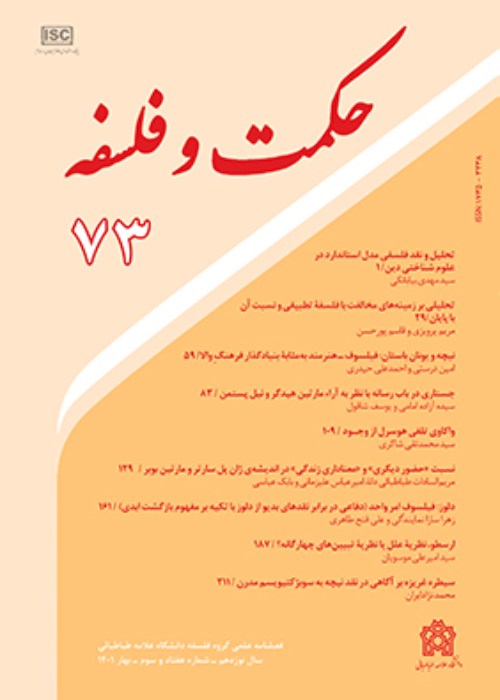Considering and Criticizing of Methodology in Descarte's Philosophy and Popper's Thoughts
Author(s):
Abstract:
In modernity era, philosophical thoughts certainly have crucial influences on the growth and development of culture and civilization of western world. Among those philosophers who have theoretical viewpoints and opinions, and furthermore have introduced efficientmethods in studying natural and human phenomena have more affection on interiorizing and making applicable philosophical thoughts in scientific, technological and cultural development of west. In this paper, two methodologies are discussed one of which isintroduced in the beginning of modernity by leading French philosopher, Rene Descartes as a general and useful method for all kinds of sciences and the other one is introduced in heyday of modernity by famous Austrian philosopher, Karl Popper as a beneficial method for studying social phenomena. Evidently, each one of these methods is relying on particular principles and is derived from special ideological and historical backgrounds. Theyhave also advantages and deficiencies which make them apt to be criticized. In this issue, the moot points above are reviewed and at the end, common aspects of both methods are considered briefly
Language:
Persian
Published:
Wisdom and Philosophy, Volume:5 Issue: 4, 2010
Page:
53
magiran.com/p795009
دانلود و مطالعه متن این مقاله با یکی از روشهای زیر امکان پذیر است:
اشتراک شخصی
با عضویت و پرداخت آنلاین حق اشتراک یکساله به مبلغ 1,390,000ريال میتوانید 70 عنوان مطلب دانلود کنید!
اشتراک سازمانی
به کتابخانه دانشگاه یا محل کار خود پیشنهاد کنید تا اشتراک سازمانی این پایگاه را برای دسترسی نامحدود همه کاربران به متن مطالب تهیه نمایند!
توجه!
- حق عضویت دریافتی صرف حمایت از نشریات عضو و نگهداری، تکمیل و توسعه مگیران میشود.
- پرداخت حق اشتراک و دانلود مقالات اجازه بازنشر آن در سایر رسانههای چاپی و دیجیتال را به کاربر نمیدهد.
In order to view content subscription is required
Personal subscription
Subscribe magiran.com for 70 € euros via PayPal and download 70 articles during a year.
Organization subscription
Please contact us to subscribe your university or library for unlimited access!


